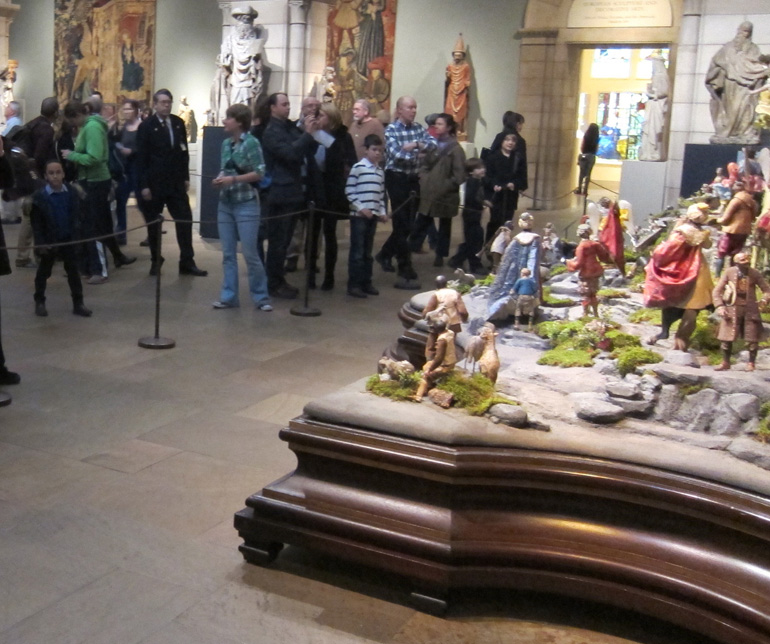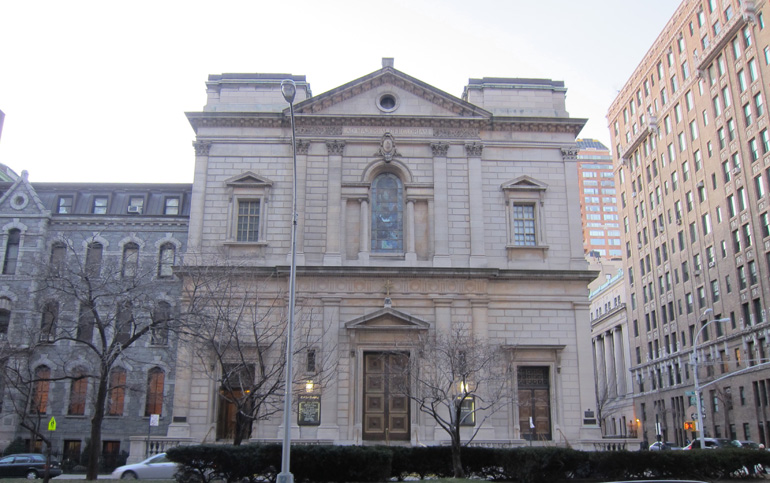
It will come as no surprise to regular readers to hear that I have never experienced what used to be called “writer’s block.” I say “used to” because it occurs to me that you never hear the phrase anymore. Perhaps it has taken the place of homosexuality as the secret that dare not breathe its name, a shocking personal defect that must never be confessed. However oppressive to sufferers of writer’s block, such a silence would atone for the attention that whining impotent writers used to claim. What’s really surprising is how sorry everyone else felt for blocked writers. Wasn’t there anything that could be done? Yes, it turned out that there was. In fact, there are at least two cures. Â
The simpler cure is to acknowledge that you are not a writer, or at least not a writer capable of compassing the thoughts that beguile you. If you are not a writer, then you must find something else to do. If you’re reaching beyond your grasp, then you must find something else within it, and get to work on that.Â
It is simpler still to acknowledge that you are a lazy, vain bum. Laziness and vanity, the gentle vices, are opposite sides of the same coin, and both reflect the absence of an active interest in life. The bum who complains of writer’s block expects his book to come to him in the form of “inspiration.” This strange idea is not entirely the bum’s fault. Ancient writers used to justify their work by claiming divine inspiration. God or a muse directed the course of every sentence, the writer doing little more than taking dictation. It’s easy to see why this theory of artistry would appeal to lazy, vain bums.
There are cases that look like writer’s block but aren’t. There’s Wagneritis, for example. This is what you’ve got when you keep realizing that you must go back to the real beginning of your story. If you are Wagner, you know when to stop. Wagner did not go back to the real beginning of his Ring story. He began at from which there were still plenty of backstories to be narrated. He was shrewd enough to distinguish the beginning of his story from the beginning of his drama. Wagner did write gorgeous music, but I do think sometimes that what made him a genius for the ages was his triumph over crippling megalomania. You can’t say that Wagner didn’t get things done.
Then there are the centipedes who have been paralysed by thinking about what they’re doing. Philosophy is not a healthy undertaking generally, but it is particularly injurious to creative writers. Some victims never recover; others, more’s the pity, stuff their philosophizing into their work, where the rest of us have to slog through it.
No, my problem was never writer’s block.
***
As noted over the weekend, I listened to Siegfried on Saturday. I haven’t listened to Wagner much in the past couple of years. Every now and then, Tristan or Die Meistersinger, rarely getting all the way through either, not because of flagging interest but because I had to go do something else before the music was over. I had the feeling that listening to Wagner was an indulgence, perhaps even a guilty pleasure. Beneath the glittering, sumptuous surface, after all, what you’ve got is unwholesome chunks of Schopenhauer. Considering his philosophy, you might think that Schopenhauer ought to have been a blocked writer: why, with such a world view, carry on at all? But carry on is what Schopenhauer miserably did. And as a result of his influence on Wagner, if we’re all going to hell in a handbasket, then what a gloriously upholstered handbasket it is!
Inclined more to duty than to volupté, I’d been listening a lot to Verdi. Verdi never had anything to do with mythology; every one of his operas has all of its feet planted firmly in the real world of human weakness. Verdi’s music contrives to make you feel things, not to imagine them. He rouses your sympathy for virtue and your thirst for justice. He doesn’t make you think about them. That’s, curiously, what Wagner’s swirling sonic orgies do: they make you think. Or at least to brood. Aside from the hero, the goddess who wakes up at the end, and the little forest bird who gives great directions, the figures in Siegfried are brooders, and their brooding is contagious.
Siegfried does as he pleases, but recklessness, while exhilarating, is never wise. The music, especially when no one is singing, is as free as the bird. These are the obviously lively aspects of the opera. But let’s consider the dragon, which is meant to be scary. Let’s register the spell of intense anxiety that opens the second act. Wagner presents these darker elements so richly that you sit back and become aware that you are having a good time. When the Wanderer (Wotan) and Mime play their game of questions, the stakes are cosmic, but cosmic with a mythologizing glimmer that releases you from the need to pay strict attention. If you ask me, Wagner actually encourages one’s mind to wander, and it’s when your mind wanders that the music grips while allowing you to continue wandering, and you slip into Wagner Time, and all of a sudden the whole thing is over.
***
I’ve just spent a half hour checking out reviews of Peter Cameron’s Coral Glynn. I read the novel in two big swallows, staying up late one night to finish it. It was a delight to read, especially after Rose Macaulay’s nonpareil The Towers of Trebizond. But I’m reluctant to write about it, because there are too many little cracks in it that suggest trapdoors to other books — references, in other words, that I’m unable to identify. I’m especially puzzled by the children in the wood whose deadly game is just about the novel’s only moving part. Who are they? And why does the author think that he can just drop the murder of one of them? Is it a joke? Is it surreptitious clue, like a symbol in Umberto Eco? And how seriously are we supposed to take the title character’s dishonesty?
Coral Glynn’s readiness to temporize, prevaricate, and withhold might in a society such as ours today be taken as pathological, but Britain in 1950 was very unlike ours today, and a girl like Coral, without family or fortune, must make the most of every opportunity, even if that means wrapping up an employer’s sapphire ring and holding it until, ahem, somebody asks for it. The simple fact is that Cameron has dropped us into a world in which our moral compasses don’t work. We may be in the milieu described by his favorite novelists — Barbara Pym, Elizabeth Taylor, and Macaulay — but the permissions are altogether different. What Pym and Macaulay could only hint at, in such a way that sophisticate readers alone knew what they were talking about, Cameron is free to discuss as openly as he likes, and if continues to rely on suggestion and innuendo, it’s for the fun of it, not the necessity.
A writer who goes unmentioned in the reviews that I’ve seen, as well as on Cameron’s Web site, is Ivy Compton-Burnett. Perhaps it’s been a while since I’ve read Compton-Burnett, but I was reminded of her on every page of Coral Glynn that was set at Hart House. (John Donne lived at Hart Hall at Oxford — does that mean anything?) A charmless pile in the middle of nowhere, Leicestershire. “There were no other houses within sight, for the meadows often flooded, and the air was damp and considered bad.” One is grateful that books don’t cast off odors. The laconic housekeeper, Mrs Prence, is right out of Compton-Burnett, too. (Or have I encountered her before in Henry James? Come to think of it, are those children revenants from “The Turn of the Screw”?) There’s a dour quality to the characters that embodies the unmentioned bleakness of Britain’s postwar rationing, still in effect in 1950, and behind it is everything heavy and uninvitingly overupholstered that one associates with the Victorians. Coral Glynn is the opposite of nostalgic.
The plot of Coral Glynn is simple to the point of absent-mindedness. Everything hangs on death. First, Mrs Hart dies. She’s the beastly old lady, afflicted with cancer, whom Coral Glynn, a visiting nurse, has been retained to care for. No sooner is she dead than her son, a middle-aged gent with a limp, asks Coral to marry him. She asks leave to think over his offer, and goes out for a walk. On the walk, she encounters a boy and a girl playing a nasty game. She tells them to stop, but does nothing else about it, and mentions what she has seen to no one. But it’s possible that she has been disturbed by what she has seen into accepting Major Hart’s offer. Why does Coral press for an early wedding? Is she afraid of interference by that former employer, whose ring she still possesses (but at a terrible cost)? Asked by a detective if she saw the children playing in the woods, Coral takes a new friend’s advice and denies it. This is, of course, a mistake. But the upshot is all very unexpected, very untrue to any known genre of fiction, even the absurd. The other shoe does not drop; rather, it evaporates. Meanwhile, Coral has a whole new life in London, and is last seen darting up to Yorkshire in what one imagines to be a sporty car, deeply in love with her second husband. It’s the friend who gave the advice who marries the Major.
Where does Coral get the nerve to insist upon inviting to her wedding luncheon not only the owner of a dress shop (with whom she has had words) but also the “pansy” from the florist’s who reminds her of her brother (killed in North Africa)? At first, the Major is willing to concede an invitation to the lady, even though she’s in trade, but he balks at the boy from the flower shop. Coral persists; it’s quite strange. Is she daft? It’s as though Fanny Price, first thing after marrying Edmund, refused to leave her chilly old quarters at Mansfield: some things just aren’t done. On a different level of composition, but just as strange, there are the occasional violations of the pitch-perfect prose, which would otherwise, at least to my New Yorker’s ears, pass for the real Brit. The only clinker that comes to mind without a search is “site-specific,” a turn of phrase that I can’t imagine anyone using in a non-military context in the middle of the last century.
“This isn’t a church wedding, Mrs Coppard,” said Coral, who worried that Dolly’s mother’s sentimentality might be site-specific.
The really odd thing about that “worry” is its suggestion that Coral wants Mrs Coppard to cry at her wedding — a desire that it’s difficult to attribute to her. Coral may be mysterious, but we know a few things about her, and one of them is a decided resserve. I don’t mean to suggest that Peter Cameron has written a high parody of Ivy Compton-Burnett, or of any other author, or even of any kind of novel. But he plays with the paints in the palettes of long-dead writers; he doesn’t copy them. “Site-specific” is clearly playful; there’s no way that a writer as painstaking (and fun-having) as Cameron could have committed a solecism of that kind.
In short, the book is, in the most amusing way imaginable, very queer. Even aside from the banked embers of Robin Lofting’s love for the Major, a boyhood passion that Clement Hart may or may not have requited, whatever the two of them did with their clothes off, long ago. It did not strike me that the Clement whom we meet in the novel was suppressing an ardor for physical contact with Robin, or any other homosexual urge; indeed, he seemed eager to marry Coral, on whatever restricted sexual terms, simply for the sake of her pretty company. So Coral Glynn is surely not a novel about a love that couldn’t be written about in 1950. It’s play once again. This sunny display of carefree virtuosity, juxtaposed against the dank gloom of a house too nondescript to describe, is the real mystery of Coral Glynn: how does Peter Cameron bring it off? One doesn’t want to enter the world that he has recreated, but one doesn’t want to stop reading about it, either.
These remarks of mine are, I suspect, more annoying than anything else. I’ve certaintly not set out to write a review. The minute I finished Coral Glynn, I was sure I had been floated across some very thin ice that would undoubtedly crack open if I attempted to report the experience. And how to register my enthusiasm? I’m happy to say that I enjoyed reading Coral Glynn, but it ought to be equally clear that I’m not eager to recommend it to anyone else. I know too many people who hate not being in on a joke. If there is a joke — and that, of course, is the joke of jokes. Peter Cameron is no stranger to experimental fiction, but he has also written Someday This Pain Will Be Useful to You, an amiable book so accessible that it was marketed, over his objections, as “Young Adult,” which is why so many readers came to it from their adolescent children. He is, in short, a past master. If he’s up to something, he doesn’t have to say. Having only just read the book once, I’m not going to hazzard any guesses.
Â




















